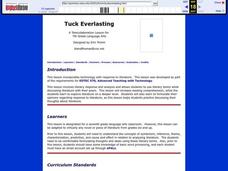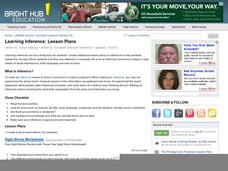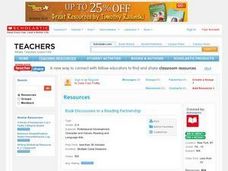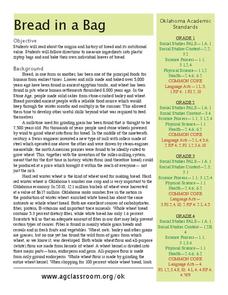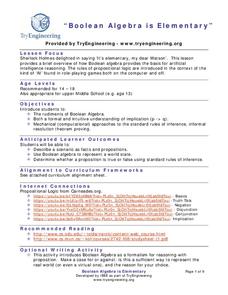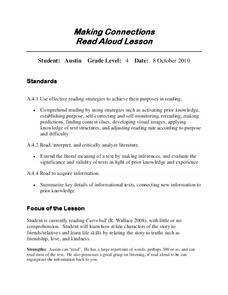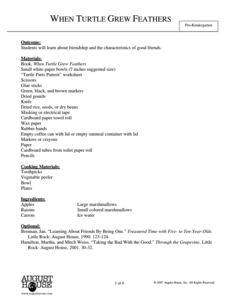Teaching Tolerance
Using Photographs to Teach Social Justice | Affirming Our Commonalities and Differences
Photos can challenge stereotypes. To gain an understanding of the big picture, groups examine a series of photographs and analyze how a photographer's choices can shape a viewer's reaction to an image. For the first set of photographs,...
Curated OER
What Can We Learn From the Past?
What would future archeologists learn from your scholars' personal belongings? Have them bring in a box of "primary sources" from their home. Discuss the difference between observations and inference, using some of your own items to...
Curated OER
Tuck Everlasting
Seventh graders use literary terms while discussing literature with their peers. They explore literature on a deeper level. Students formulate their opinions regarding response to literature, as this lesson helps students practice...
Curated OER
Observations and Inferences
Learners observe how to distinguish observations form inferences. In this examining inferences instructional activity students list observations relating to the activity and discuss the importance of them.
Curated OER
Learning Inference
Making inferences can be a tricky proposition for middle schoolers. In the lesson presented here, pupils practice the skill of drawing a conclusion and making a judgment - which are what making an inference is all about! There are five...
American Physiological Society
Did I Observe it or Infer it?
Take the mystery out of inquiry! When young scientists learn to use their keen powers of observation to make smart inferences about a situation, they are well on their way to understanding what the scientific method is all...
Curated OER
Book Discussions in a Reading Partnership
Do you have a lot of different reading levels in your class? Pair kids up by level and have them choose a book to read independently. They will make predictions, ask questions, make connections, etc. Consider creating a general reading...
Curated OER
Bread in a Bag
Could the history of bread really be interesting? Yes, it could! An informational text gives scholars wheat production background from 8,000 years ago, discussing different types of bread and the current industry in Oklahoma. Learners...
TryEngineering
Boolean Algebra is Elementary
See how Boolean algebra relates to video games with a lesson that teaches young scholars how to use Boolean algebra to create rules for a virtual world. They test the rule base for consistency in groups.
NOAA
The Oceanographic Yo-yo
How does chemistry help deep-sea explorers? Part four of a five-part series of lessons from aboard the Okeanos Explorer introduces middle school scientists to technologies used in ocean exploration. Groups work together to analyze data...
August House
The Great Smelly, Slobbery, Small-Tooth Dog
Read the story The Great Smelly, Slobbery, Small-Tooth Dog: A Folktale from Great Britain by Margaret Read MacDonald and choose from multiple activities to learn about the tale's theme—kindness. With so many options, your kind kids will...
Science 4 Inquiry
The Ups and Downs of Populations
Life has its ups and downs ... especially if you're an animal! Biology scholars engage in a population study through an inquiry-based lesson. Pupils work together to explore the factors that affect deer populations, then examine the...
EngageNY
Mid-Unit Assessment: Evidence and Inference in Pygmalion
Scholars complete the Pygmalion mid-unit assessment to show their progress toward the unit's stated goals. The assessment requires learners to read text and successfully answer multiple choice and extended response questions.
Curated OER
Lesson Three: Strategies to Infer
Third graders make inferences with a text. In this inferring instructional activity, 3rd graders read Town Mouse Country Mouse by Jan Brett and they discuss the differences between city and country life. They make inferences as they...
Curated OER
Making Connections
Fourth graders investigate visual imagery to aid reading comprehension. In this reading strategies lesson, 4th graders discover how visual imagery helps in comprehending a story. Students use a reader's notebook to record connections.
Ohio Department of Education
Observe Then Infer
To develop their skill at drawing inferences from observations, sixth graders rotate through six stations, conduct a series of experiments, make observations, and draw inference from what they observe.
NOAA
Journey to the Unknown
What's it like to be a deep-sea explorer? Tap into the imaginations of your fifth and sixth graders with a vivid lesson, the second part of a six-part adventure. Learners close their eyes and submerge themselves in an expedition aboard...
EngageNY
Comparing Meaning and Tone: The Fall of Saigon in Fiction and Informational Text
Who's that talking to? Readers listen to a reading of the "Forgotten Ship" transcript and answer questions focusing on word meaning and choice. They complete a chart to track the multiple narrators in the script. For homework, readers...
C-SPAN
Choice Board: Expressed and Implied Powers
Article 1, Section 8 of the United States Constitution expressly lists powers given to Congress. Over the years, lawmakers have expanded the enumerated powers to include powers implied by the list. To better understand the significance...
Towson University
Case of the Crown Jewels
Can your biology class crack the Case of the Crown Jewels? Junior forensics experts try their hands at DNA restriction analysis in an exciting lab activity. The lesson introduces the concept of restriction analysis, teaches pipetting and...
August House
When Turtle Grew Feathers
Friendship is a valuable part of growing up. Learn about the importance of friendship with a variety of activities based on When Turtle Grew Feathers by Tim Tingle. Kids practice making musical instruments, discussing plot points,...
Curated OER
Call It a Hunch
Give young scholars a chance to practice making inferences after reading the book Through My Eyes by Ruby Bridges. They confirm whether or not their conclusions are true, have a class discussion, and then independently complete an...
CPALMS
Analyzing Vonnegut's View of the Future and His Commentary on the Present in Harrison Bergeron
Kurt Vonnegut's short story "Harrison Bergeron" engages adolescents with its theme about the dangers of complete societal equality. Learners complete a graphic organizer to track literary elements in the story, as well as an inference...
Curated OER
Analyzing Atmosphere: Macbeth Murder Scene and Dagger Speech
Shakespeare's Macbeth (Act II, Scenes I and II) lacks explicit details of the murder of King Duncan, yet the author creates an atmosphere that allows us to visualize the event. Readers interpret the "Dagger Speech" by writing stage...




